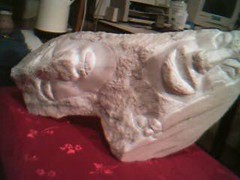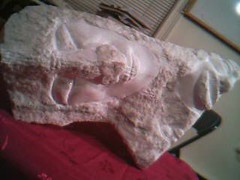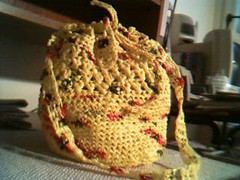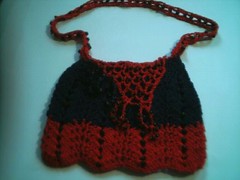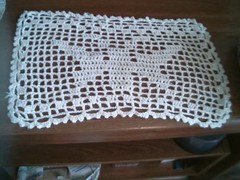jueves, marzo 31, 2005
the family
mi arte.
Esta es una pieza que esculpi en marmol, en el Worcester Art Museum.
Quise representar el mestizaje de nuestra America.
miércoles, marzo 30, 2005
plastic bag
un ejemplo de las posibilidades del reciclaje.
Las bolsitas de nylon que nos dan en el supermercado, son altamente contaminantes del medio.
Con una técnica muy sencilla las corté e hice ovillos con los que tejà este bosito.
Me llevó 5 bolsitas chicas.
viernes, marzo 25, 2005
Building Community
Last spring I works in a community garden in my neighborhood. It was a very interesting experience shared with families from differents countries. Some of this people were students, social workers, artists, agronomy engineer, etc.
The city brought us organic soil. We prepaired the beds and pulled all the weeds. We had a wheelbarrow, some pitchforks, rakes and hoes. We shared all the work from the digging of the plot to the harvest.
We wanted to grow organic food, but we didn't have seeds, so the Regional Environmental Council brought us some. We planted cherry tomatoes, radishes, turnips, basil, peppers, all kind of herbs, peas, eggplants, cabbages, squashes, weatermelos, cucumbers, etc The problem was that there was too many turnips and radishes.When this crops were grown we didn't know what to do with them. We send some harvest to "Food not bombs" and with the rest was used for a very fanny workshop of souerkraut, pesto and dried herbs.
Because we are ambitious we are dreamming with a seeds bank, and we are going to start one on next summer-fall.
This year we are going to statrt gardening again. We will have our first meeting next Sunday, April 3, 4pm. I invite you to join us and enjoy this extraordinaire community experience.Also I invite you to a workshop, "Seeds of Change, held in Centro las Americas, next April 9 (1 to 6pm).
martes, marzo 15, 2005
sic transis
I was born in Uruguay, small country settled in South America, a wedge that separates the two powers of south. In a country with an agribusiness base economy, (primarily of export), the meat caused flourished the frigorificos and the wool the textiles factories. We could not avoid the dictatorships of the seventies, and we live many years of obscurantism under the military boot, during which the sources of work were lost and the labor rights obtained in the epoch of the Switzerland of America, and we live a strong economic crisis. It was in that context in which somebody managed to sell the labor force of the women that knit "for exportation" in conditions at times distressing, all the night in light of a candle, in poorest houses made of sod, in the middle of the field. It touched me to organize to the people for "to take forward " the productions, to teach to knit, to work as a group with the designers or buyers (almost always from usa) to create the samples that would be sold, to do quality control, to do the patterns and diagrams, in short, to manage to have the orders in time and form.
What began being a hobby that enjoyed a lot finished being a profession that gave me many satisfactions. The knitting by hand continued the road of the other products in the world and the buyers displaced to China, where the productions are larger, faster and cheaper.
Though I enjoyed a lot of this work, the to do of intermediary with the one that was appropriated of the profit, the to knit the design of another person and the to supervise a badly payed and repetitive work, that the majority of the kniters did as a prison sentence of the one that himself cannot escape, did not permit me to feel the pleasure to create freely like I am doing now, knitting without none obligation, by the simple esthetic pleasure.
lunes, marzo 14, 2005
Sic transis
Nací en Uruguay, pequeño país enclavado en Sud America, una cuña que separa las dos potencias de sur.
En un país con una economía de base agropecuaria, ( primordialmente de exportación), la carne hizo florecer los frigoríficos y la lana las textiles.
No pudimos evitar las dictaduras de los setentas, y vivimos muchos años de oscurantismo bajo la bota militar, durante los cuales se perdieron las fuentes de trabajo y los derechos laborales obtenidos en la época de la Suiza de America, y vivimos una fuerte crisis económica.
Fué en ese contexto en el que algunos lograron vender la fuerza de trabajo de las mujeres que tejían "para exportacion" en condiciones a veces angustiantes, toda la noche a la luz de una vela, en ranchitos de terron, en el medio del campo.
A mi me tocó organizar a la gente para "sacar" las producciones, enseñar a tejer, trabajar en conjunto con los diseñadores o compradores ( casi siempre de USA) para crear las muestras que se venderían, hacer control de calidad, hacer las recetas y diagramas, en fin, lograr tener los pedidos en tiempo y forma.
Lo que comenzó siendo un hobby que disfrutaba mucho terminó siendo una profesión que me dió muchas satisfacciones.
El tejido a mano siguió el camino de los demás productos en el mundo y los compradores se desplazaron a China, donde las producciones son más grandes, más rápidas y más baratas.
Si bien disfruté mucho de este trabajo, el hacer de intermediario con el que se apropiaba de la ganancia, el tejer el diseño de otra persona y el supervisar un trabajo repetitivo y mal pagado, que la mayoría de las tejedoras hacía como una condena de la que no se puede escapar, no me permitía sentir el placer de crear libremente como lo estoy haciendo en este momento, tejiendo sin ninguna obligación, por el simple placer estético.
sábado, marzo 12, 2005
La cartera de Pao
comencé con 70 cadenetas y cerré en redondo, luego tejí una hilera de varetas, lluego tres varetas en el mismo punto, una perla ( inventé una técnica para incorporar la perla), tres varetas en el mismo punto, saltar dos y hacer una vareta, saltar uno, una vareta, saltar uno, una vareta, saltar dos puntos y tres varetas en el mismo punto, una perla, tres varetas en el mismo punto...
Este mismo punto lo repetí hasta el final, combinando los colores.
La solapa la hice en red, achicando una onda siempre del mismo lado, luego flecos con perlas.
